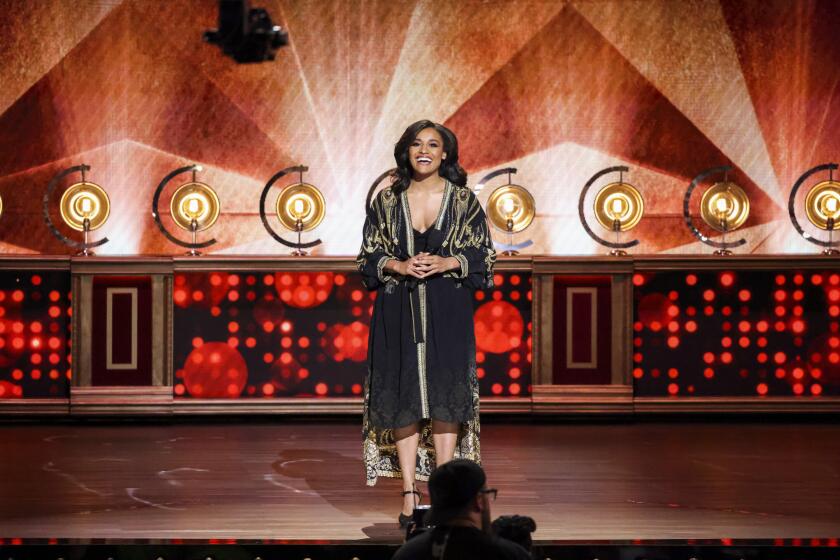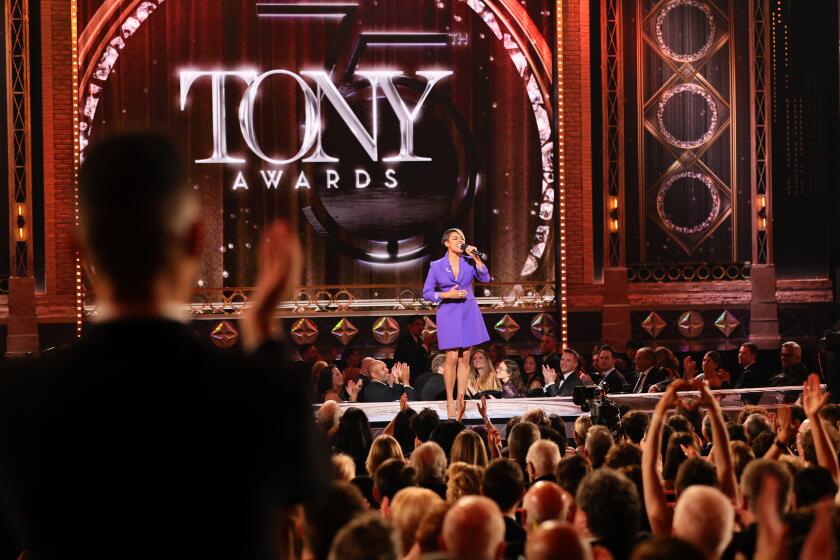Commentary: An unscripted Tony Awards 2023 found meaning and eloquence on a historic night
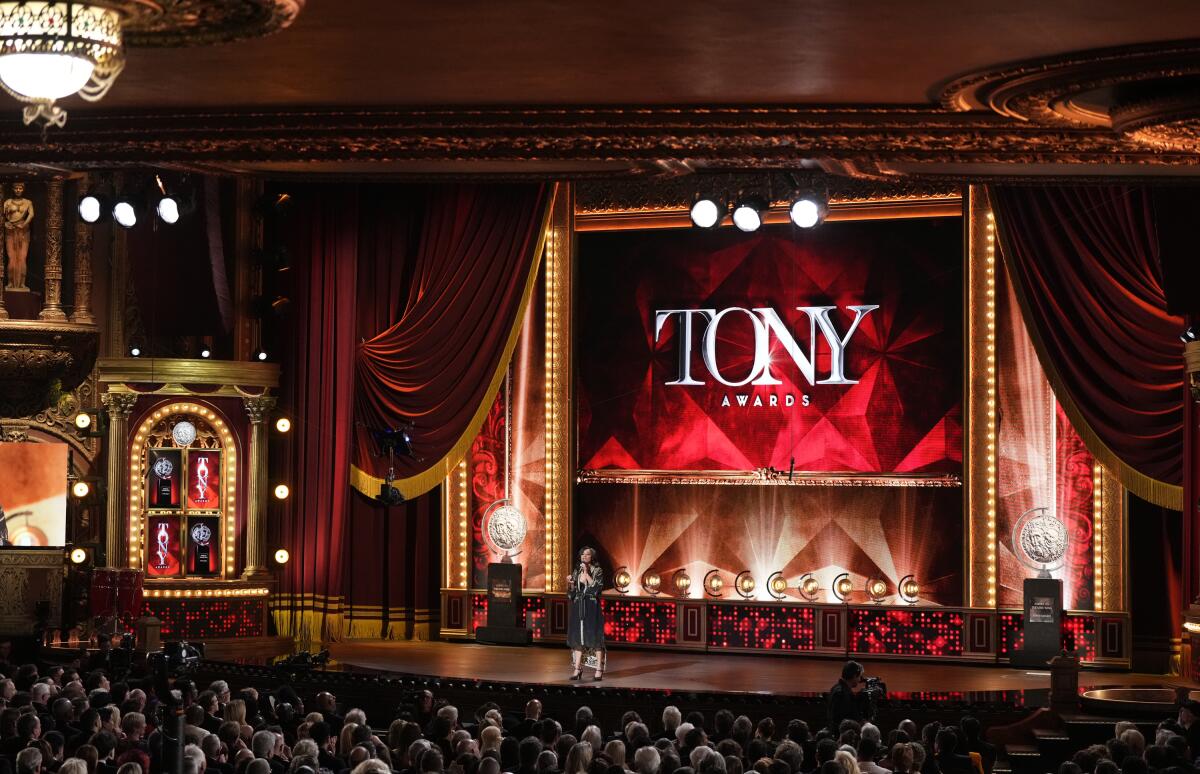
- Share via
The ceremony for the Tony Awards was unscripted this year because of the Writers Guild of America strike, but playwrights, librettists and lyricists were omnipresent throughout an evening that recognized the centrality of the written word.
Speaker after speaker at the United Palace in Manhattan’s Washington Heights neighborhood, where the event was held on Sunday, paid tribute to those who spend their time arranging words on the page.
“Writers are not just the cornerstone of theatrical production — the sharp end of the inverted pyramid,” as Tom Stoppard more eloquently put it when he accepted the best play award for “Leopoldstadt.” They are the articulators of our values and the search lights of our consciousness.
The WGA had asked its members not to attend, but it was moving to see so many artists advance the cause of the union by refusing to be invisible and by speaking truth to power.
The WGA announced Monday that it would not picket the Broadway awards show, scheduled for June 11, allowing it to proceed in altered form.
Capitalism undervalues the soul, which is the locus of writers’ activity. Ironically, the script-free ceremony, hosted by Ariana DeBose with sharp focus, was one of the most soulful Tony Awards in history, because there were no intermediaries brought in by the network to check off boxes that executives deemed necessary.
Theater people were allowed to be theater people. Which is to say artists were allowed be full humans — open about their dreams, their struggles and their experiences of difference.
There were speeches in support of trans and nonbinary people on a night when history was made with two awards going to nonbinary performers — Alex Newell, winning for featured actor in a musical (“Shucked”), and J. Harrison Ghee, winning for lead actor in a musical (“Some Like It Hot”).
The tone, however, was never political for politics’ sake. Artists spoke from their own experience, as Michael Arden (who won for his direction of the musical “Parade”) bravely exemplified when he recalled being called the “F-word” as a gay youth.
Arden then reclaimed the homophobic slur, exclaiming: “Now I’m a f— with a Tony!” to rapturous applause. CBS apparently found this a bit too brave and bleeped the speech in the telecast. But the point was to communicate to all those LGBTQ+ kids watching across America that they are not alone and that their dreams not only matter but are indeed achievable with hard work, determination and a survivor’s defiance.
The Tony Awards were handed out in an unusual ceremony in New York on Sunday. Here’s the full winners list.
Controversy ensued at the ceremony when actor Denée Benton presented the Excellence in Theatre Education Award from Carnegie Mellon University to Jason Zembuch Young, of South Plantation High School in Plantation, Fla. Benton referred to Florida Gov. Ron DeSantis as the state’s “Grand Wizard,” a reference to Ku Klux Klan leadership that she quickly corrected but not before the entire theater was cheering her on.
Looked at one way, the Tony Awards were everything DeSantis has been railing against in his fear-mongering messaging. But I couldn’t help thinking of how many people were helped, in blue and red states alike, by hearing from artists who once were watching the Tony Awards at home, wondering if they would ever find a place for themselves in the world and be judged on the basis of their talents alone.
The secret that theater people have no trouble understanding is that most human beings worry that some aspect of their identity might be disqualifying in a world openly intolerant of difference. The voice that right-wing conservative politicians want to demonize is actually the voice that is trying to say, “I see you, I hear you and I welcome you.”
Once again at the Tony Awards, eloquence was achieved in the acceptance speeches. Tony winners don’t waste a lot of time thanking their agents, managers and publicists. The precious airtime is reserved for more courageous personal testimony.
The absence of scripted patter cleared the way for a more authentic form of communication. Again and again, those who were being honored shared their struggles and feelings of shame not to elicit sympathy but to give others hope.
The musical “Some Like It Hot” led with 13 Tony nominations. “Kimberly Akimbo,” the critical pick for best musical, received 8. Tom Stoppard’s play “Leopoldstadt,” “Ain’t No Mo’” and the revival of “A Doll’s House” garnered six nods each.
“Thank you for seeing me, Broadway,” Newell said on accepting their award. “I should not be up here, as a queer, nonbinary, fat, Black baby from Massachusetts. And to anyone that thinks that they can’t do it, I’m going to look you dead in your face [and tell you] that you can do anything you put your mind to.”
Ghee struck a similar note in their acceptance speech: “For every trans, nonbinary, gender-nonconforming human, whoever was told you couldn’t be, you couldn’t be seen, this is for you.”
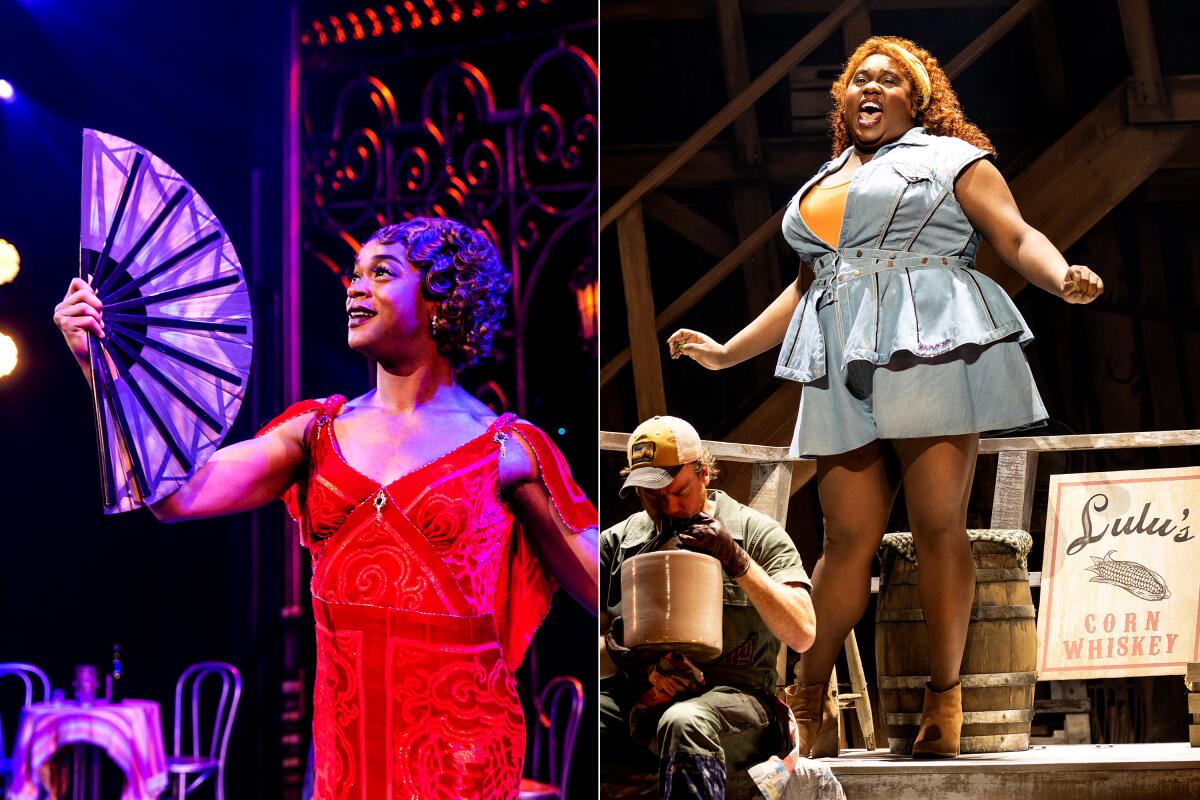
The pervasiveness of racism was acknowledged. Suzan-Lori Parks, while accepting the Tony for the revival of her play “Topdog/Underdog,” thanked her actors for “living large in a world that often doesn’t want the likes of us living at all.”
But the power of unconditional love was a theme of the night. Whether they grew up queer, nonbinary or trans, whether they experienced oppression stemming from gender, race, ability or size, those who were honored attested to the role early encouragement played in allowing them to realize what otherwise would have been impossible.
A child affirmed has an enhanced capacity for generosity. “My mother raised me to understand that my gifts that God gave me were not about me,” Ghee said. “To use them to be effective in the world, to help somebody else’s journey. So thank you for teaching me how to live, how to love, how to give.”
These lines echoed sentiments expressed by director and choreographer Jerry Mitchell, who in his acceptance of the Isabelle Stevenson Award for his philanthropic efforts in raising money for Broadway Cares/Equity Fights AIDS quoted the playwright George Bernard Shaw: “I am of the opinion that my life belongs to the whole community. And as long as I live, it is my privilege to do for it what I can. I want to be thoroughly used up when I die, for the harder I work, the more I live.”
The threat to this year’s Tonys underscored their sway over the industry. Some say making them the ‘be-all, end-all’ of shows’ survival is risky business.
These words of a brilliant dramatist were not just moving to hear spoken by a 21st century director and choreographer committed to making a difference. They were a reminder of what writers uniquely offer us.
Everyone in attendance at the Tony Awards was there in part because of the space that was created by the words of a playwright or a lyricist. Words that mapped out another way of living in the world. A way of greater empathy and connection. An understanding that “no one is alone,” as Stephen Sondheim indelibly put it in a lyric from “Into the Woods,” one of the year’s most successful revivals.
Writers were the heart and soul of this Broadway season, which was notable not only for the rich array of dramas but also for the complexity and literary distinction of the musicals. Alfred Uhry and Jason Robert Brown’s “Parade,” about the trial and antisemitic lynching of Leo Frank, won for musical revival in what was one of the year’s most competitive categories. The other nominees — “Into the Woods,” “Sweeney Todd” and “Camelot” — revealed the limitless scope of what’s possible when text meets music.
“Kimberly Akimbo,” which David Lindsay-Abaire and composer Jeanine Tesori adapted from Lindsay-Abaire’s 2001 play, won for best musical. The show, about a teenage girl with a medical condition that prematurely ages her, is all about finding the strength to accept and appreciate the only life you have — a idea that Lindsay-Abaire implicitly reiterated in tracing his own path as a writer when accepting the award for best book of a musical.
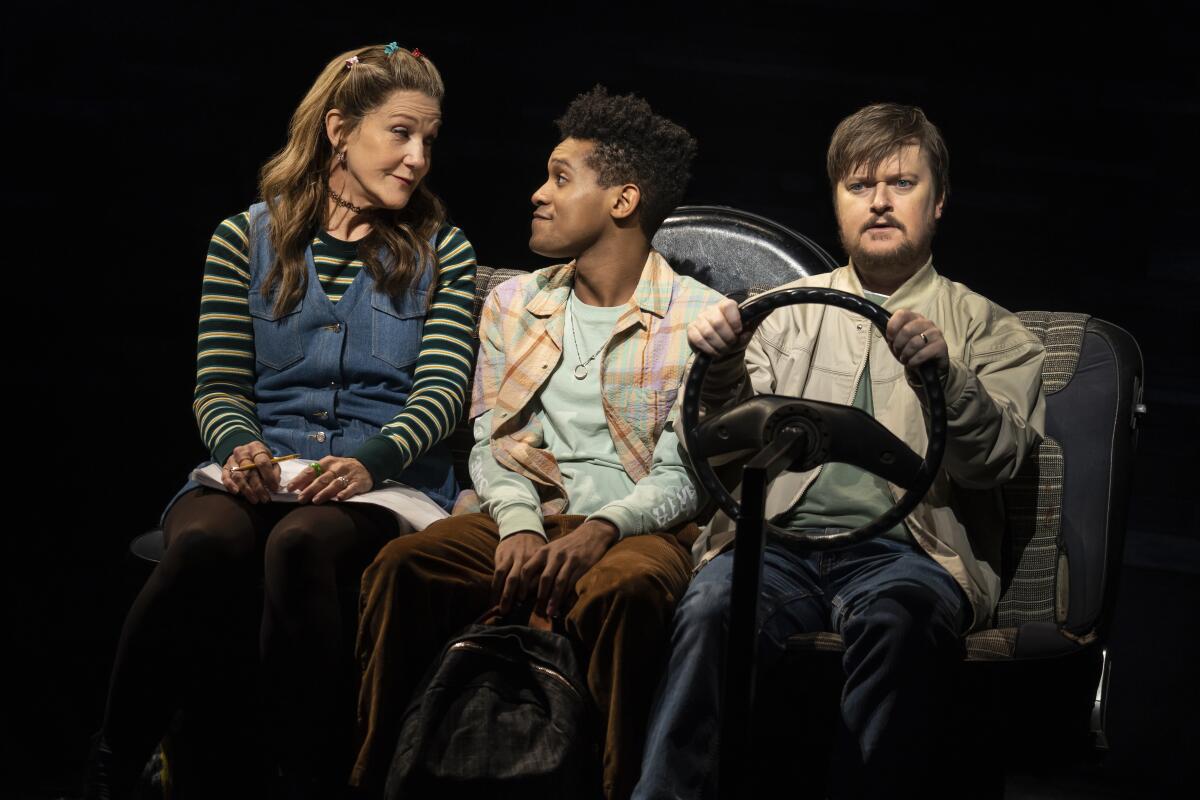
In his acceptance speech for best play, Stoppard succinctly articulated the reason there was so much solidarity with the striking screenwriters. Describing himself as someone “teeming with emotions that a chatbot wouldn’t begin to understand,” he lamented the way theater writers have been “progressively devalued on the food chain.”
Without a script, he said, we’re all basically “flummoxed.” If this wasn’t the case at this year’s Tony Awards, it was because all in the room were beneficiaries of a long noble line of dramatic poets.
More to Read
The biggest entertainment stories
Get our big stories about Hollywood, film, television, music, arts, culture and more right in your inbox as soon as they publish.
You may occasionally receive promotional content from the Los Angeles Times.

